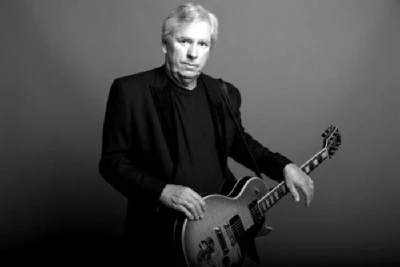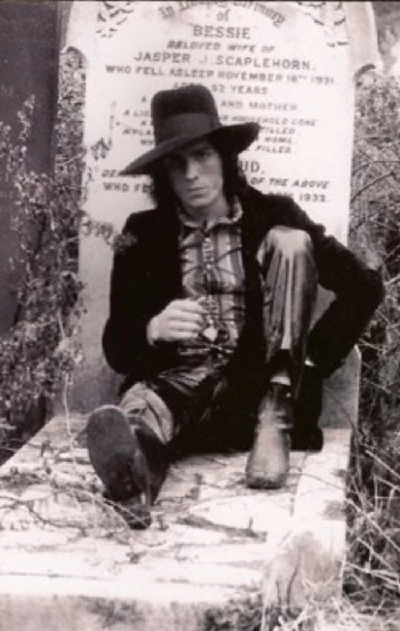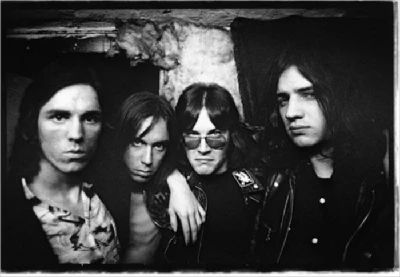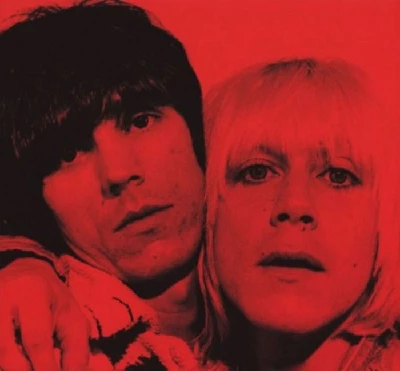published: 4 /
12 /
2010
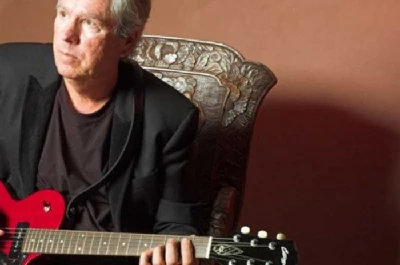
Iggy and the Stooges and 'Raw Power' guitarist James Williamson recently started touring with the band again after an absence of over thirty five years. He speaks to John Clarkson about his remarkable return to playing music
Article
Of all the musical comebacks of recent years, there have been few as surprising or as remarkable as that of Stooges guitarist James Williamson.
The Stooges had already recorded their first two albums, ‘The Stooges’ (Elektra, 1969) and ‘Fun House’ (Elektra, 1970), when former reform school boy Williamson joined the Ann Arbor, Michigan-based group in late 1970 initially as a second guitarist.
The notorious drugs band, however, broke up a few months later in mid 1971, but reformed in the Spring of 1972 under the new moniker of Iggy and The Stooges when front man Iggy Pop and Williamson were invited by David Bowie, who was a Stooges fan, to come to London to record a third album. They were later joined by former Stooges members, Ron Asheton, who switched from guitar to bass, and his brother Dave Asheton, who remained on drums.
In comparison to the more avant-garde leanings of the previous two Stooges albums, Williamson’s raucous lead guitar work gave the resulting Bowie-produced ‘Raw Power’(Columbia, 1973)and its stand-out track ‘Search and Destroy’, a brazen, menacing and obnoxious edge. The album sold poorly on its release, but became in the latter part of the 1970s a seminal influence on the then fledgling UK and US punk movements.
Having been dropped by another label and as drugs again began to have an effect, the Stooges broke up once more. Pop and Williamson resurfaced in Los Angeles in 1975 where they recorded another album together, the scrappily-recorded ‘Kill City’, which was finally released on Bomp Records in 1977.
Williamson worked as a producer and a co-writer on Pop’s 1979 album, ‘New Values’ (confining himself to playing guitar on just one track, the classic ‘Don’t Look Down’), and also did initial production work on Pop’s 1980 album, ‘Soldier’.
By the early 1980s he had, however, dropped out of the music industry to focus on a career in electronics. Remaining in California, he eventually became Vice President of Technology Standards for Sony.
The Stooges, with Pop and both Ashetons involved, had reformed in 2003. Williamson rejoined Iggy and The Stooges following the death of Ron Asheton in January 2009, playing his first reunion concert with them in November of that year in front of 30,000 people at San Paulo in Brazil. He has also speared a reissue of ‘Kill City’, which came out in a re-mastered cleaner-sounding version on Alive Records in December.
Pennyblackmusic spoke to James Williamson about his extraordinary return to music.
PB: You joined the Stooges in 1970, but before then you played in a band called the Chosen Few which at one point featured Ron Asheton. Had you known all the Stooges for a long time before you actually joined them?
JW: Yes, I had. I wasn’t actually in the Chosen Few when I met Ron. I had left them by that stage and had come up to watch them play a gig after he had joined late on in that band’s lifetime. I met him and Iggy at one of their shows at a frat party and we stayed in touch after that. That must have been roughly 1967 or 1968. They lived in Ann Arbor and I lived in Detroit, which is about an hour or so away, and when I got a chance I would go up there and hang out with them. Over the years we had gotten to know each other fairly well.
PB: Were you in any other bands other than the Chosen Few before you joined the Stooges?
JW: I played music with a lot of other guys, but I wasn’t really. For a time I went off to school in upstate New York. At school the guys that play instruments always gravitate towards the other guys that play instruments and we put together a little band. It turned out that it was called the Coba Seas. I really didn’t remember that that was what it was called because it was just a kind of informal name. In any case I did play with those guys and Norton Records have just released an album of recordings of that band. There is all kinds of stuff coming out that I had forgotten about.
PB: Were you writing your own material with this band and at what stage did you start writing music rather than simply doing covers?
JW: I didn’t write any music with the Coba Seas. That was just an instrumental covers band. I did, however, start writing music almost from the beginning because I found it easier to write my own stuff rather than to learn other people’s stuff. When I met Iggy the very first time, I had my guitar with me and I played him some of my original stuff and I think that stuck with him.
PB: Were you largely self-taught as a guitarist? If people are taught things they can often get into a certain way of doing things. Your guitar playing, however, became influential because it was so different and unusual.
JW: Pretty much. I was an army brat and so we moved around a lot. I was born in Texas and we moved to Oklahama and then to Detroit. That was around eighth grade. I happened to move next door to a guy that could play guitar already and I spent my first summer there learning how to play all the proper chords , bar chords and all that. Once I was finished with that I was on my own and I pretty much developed my own way of playing from there. Like you say you adopt your own style that way. My style is unique. Nobody teaches you my style.
PB: When you joined the Stooges, that line-up broke up fairly quickly afterwards. Much has been made of the band’s drug abuse. The band had, however, just been dropped by Elektra Records. How much of an impact did that too have on the group breaking up at that stage?
JW: It was a combination of us and them. We were together briefly. We played some shows for a few months and then it was time for Elektra to renew or drop us. A couple of guys from Elektra showed up at the Stooges’ house in Ann Arbor and we played them some of our new music which was all original music and they just couldn’t relate to it at all.
There were all kinds of other things involved, but basically once they had dropped us we felt that that there was so many other problems that we had on top of that that we had to stop. I had developed a case of hepatitis and I was really pretty low energy. There were the drugs and you name it we had it. We couldn’t carry on.
PB: How quickly did it take you and Iggy to get back together and was it just the invitation to go to England with David Bowie that gave you the push to start up again?
JW: No, during all the time of my recuperation he was also recuperating and after a few months all the engines and wheels were turning and he was thinking up ways to start something new up because he really wanted to play music with me.
The David Bowie thing was really just serendipity. Bowie was in New York and he was staying at our old manager Danny Fields’ apartment. He asked Danny if he could meet Iggy and Danny called him up and the rest is history.
PB: How did the songwriting work on ‘Raw Power’ and ‘Kill City’? Did you provide the music and Iggy the lyrics or did it work in another way?
JW: I have frequently referred to my writing of riffs as songs when in fact they’re not. They’re just riffs and normally the way we would work together and still do is that I’ll come up with a riff. To me the riff has to stand the test of I can play it more than five times without getting sick of it. There are quite a few along the way that have been rejected and so once I have got to the point where something captures my imagination then I take it to Iggy and see if that works for him too. The ones that do work we start working up lyrics for.
As for the lyrics, he pretty much wrote all the lyrics for ‘Raw Power’ and ‘Kill City’, although there were a few that he didn’t and then he would help me with the arrangements especially in the beginning because he had more experience than I did. ‘Raw Power’ was my first album and so we would work up the arrangements together and make it into a song.
That is how we worked and it still is how we work really. It is a kind of intuitive project but it starts out with a riff.
PB: And then do the rest of the band came in and add their bit?
JW: Exactly. We then play it with the band, but we don’t chart that out for them. They come up with their own ideas and if we like it we just keep playing it.
PB: You have described yourself as a “highly emotional guitarist” Were both ‘Raw Power’ and ‘Kill City’ reflections of your emotional state at that time?
JW: Yes. I think that the genesis for those albums and right from the beginning was that when I first started playing guitar the guitar was an emotional outlet for me. My style was developed really as a way of dealing with emotions. And so I would stand hours and hours and hours working stuff up and playing it and a lot of it would never come to anything, but it would allow me to let off steam.
When we recorded both those albums my style had developed and evolved, but the guitar was still a kind of language for me because I was not the most verbal person at that stage. It was an emotional tool and outlet for me.
PB: 'Raw Power’ has now been through two mixes. There was the original one from David Bowie in 1973 and then one which Iggy did in the late 90s, neither of which the group has been especially happy with. Do you feel that there is the scope for an additional mix still or would you rather just leave it as it is now?
JW: It doesn’t really matter what I feel because I am not sure that it is really on the cards anymore, especially after the big run-up on the last one, but if it were I have said that I would like to take a crack at it. If not then I think the other interesting idea would be to release the tracks and let the fans do their own mixes.
PB: In light of that why did you decide to become involved in the reissue and remastering of ‘Kill City’?
JW: I thought that it needed it. In the process of re-engaging with the band and getting ready to tour I spent a lot of time in LA and I had occasion to go today for dinner with the people at Alive Records who were thinking of re-releasing it.
The original stereo mixes had, however, been lost. Greg Shaw at Bomp had misplaced them or lost them somewhere along the line and he was no longer around to tell us where they were. We did, however, have the multi track remasters though. I had never really thought that the original remix was the best and I wanted to do a do-over anyway, so it was the opportunity to do so. We were under a lot of budget and time constraints, but I was lucky enough to convince the best guy that I have ever worked with, Ed Cheney, to come in and remix it with me and he just did an incredible job with it.
PB: This was your first time in the studio in over thirty years. Technology has obviously progressed a lot since then. Was it difficult to adjust to the new technology?
JW: It wasn’t because we did it old school for the most part. The remix was done at Capitol Records in Studio B with the old Neve console in there. We did have ProTools running and made digital copies in case the analogue gear went wrong because it was quite old at that point, but mostly it was done old-fashioned style. I think that it sounds better for that.
PB: The material on ‘Kill City’ was originally meant to be just a set of demos. Was the intention to eventually record the album again properly?
JW: Correct. We had written them in order to get a proper demo to get a record deal which never materialised.
PB: Do you think that if things had been different and it had been recorded as planned in better circumstances with a better budget it might have been another Stooges album?
JW: Well, I think that if we had gotten a record deal there is a very good chance that it could have been a Stooges album. We have a history of disbanding and reforming (Laughs) and so there is a very good chance that could have happened, although I was very pleased with the guys that did play on it. I love that album. I think that it has a certain characteristic about it that is pretty hard to capture on tape really and I am glad that it has been mixed properly. I really enjoy that album.
PB: There is compared to ‘Raw Power’ a lot of harmonies on ‘Kill City’. Was that something which the Stooges were doing laterally before they split?
JW: It was. We were starting to be referred to by Stooges insiders as “the Singing Stooges” (Laughs) and towards the end we had added harmonies. Scott Thurston (Pianist in Stooges in 1973/194 and also guitarist on 'New Values'-Ed) was a good singer and he always could do back ups. Ronnie could sing okay and I was really crappy, but I liked the way it sounded to have guys doing back up. We luckily though never turned up my mic as loud as the other guys (Laughs).
PB: You and Iggy were briefly in a group around the time ‘Kill City’ was recorded with Ray Manzarek from the Doors. What happened to that group?
JW: There wasn’t really ever a group. We were drifting around a little bit and we were looking for things that might work. Danny Sugarman, who was involved with Ray Manzarek and who had been involved with the Doors, was also close to Iggy. He brokered that a little bit and Ray could see that Iggy was maybe his next Jim Morrison. In those days when you got Iggy you got me and so Iggy brought me along, but it just wasn’t going to work because I play real loud and aggressively and he was used to having Robbie Krieger noodling around in the background to his keyboards( Laughs). Ray is a nice guy, but as musicians we weren’t compatible.
PB: None of the Stooges albums did well when they first came out, but gradually they built up a following. At what point did you realise that you had become an influence on other bands and musicians?
JW: Not until relatively recently. Probably not until the mid to the late 90’s did I start to realise how influential I had become. I think that Iggy knew a lot earlier because of his long career. I was reluctant to believe that though because in the day we really didn’t have any success and in fact most people especially music insiders didn’t like what we were doing at all.
A couple of things influenced my viewpoint. First of all I kept getting hounded by people wanting to interview me (Laughs). I almost did no interviews for a long time, but when I started doing them interviewers would tell me little bits and pieces. As I started listening to what was being played on the radio as well and saw what was happening, I could hear myself in that music and I began to realise that all this had happened in my absence.
Then some fairly large bands like the Red Hot Chili Peppers and Guns ‘n’ Roses and those guys started doing covers of Stooges songs and that was when I finally thought, “Well, okay.”
PB: It is remarkable that it took you so long to realise it because from as early as 1977 and 1978 bands such as the Dead Kennedys and the Sex Pistols started to cite you as an influence.
JW: Well, I had given up on music by then. I wasn’t in tune with everything that was going on. I had put down my guitar and I was in a completely different environment. I would hear things here and there, but I had heard all that before and I wasn’t buying it at first (Laughs).
PB: When you started working in the electronics industry was that a deliberate decision to get as far away from music as possible?
JW: No, it was a decision to get into electronics. I was fascinated by the personal computer when it first arrived on the scene in about 1976 and it was exciting to me in a way that rock ‘n’ roll no longer was to me. Music had run its course for me and I had simply moved on.
PB: How much guitar playing had you done in the thirty odd years since you had left music?
JW: Hardly any. I had become interested in Hawaiian music and I started playing music in that style of guitar two or three years ago, but it was only when I agreed to do this at the beginning of last year that I started getting back into playing loud rock ‘n’ roll music.
PB: Iggy apparently invited you to rejoin some months before you actually did, but you turned him down. What was the turning point with you? What made you change your mind?
JW: When he first asked me, I still had a day job at Sony. I was flattered, but I couldn’t do it. Then all these early retirement packages came out because of the economy and, while they were voluntary, they were nonetheless very attractive and I thought to myself, “I can’t pass this up” and so I took mine. Suddenly I was available and so I called him back and said, “If you still want to do it, let’s do it.”
PB: That’s one of the few examples of the recession ever actually working for someone.
JW: Exactly (Laughs).Go figure
PB: Once you had got the package did you think long and hard about rejoining or was it a fairly instant decision?
JW: I had a few days of mulling it over. I wanted to talk to my wife about it, but the long and short of it is that I wanted not to have any regrets at the end of the day and I had also known those guys since my teens. That goes a long way in my book.
They also were running out of Stooges, so in order to go back out they needed me to rejoin. It is hard to call yourself the Stooges when you haven’t got any Stooges. You can’t call yourself Iggy and the Stooge (Laughs).
PB: Before you played with Iggy and the Stooges at their first show in Brazil you played a warm up show with a band called Careless Hearts. Who are they?
JW: Careless Hearts are a local band in North California where I live. While they are a country band and their music is not in the style of the Stooges, all the guys in the band had played Stooges music when they were growing up. They offered to rehearse me when I was getting ready to step back up. It is much stiffer to rehearse on your own as a single person rather than as a band, so in exchange I offered to play one live show with them and we did that in September of 2009.
That show was recorded and subsequently released. I think that it was a good show. It was at a small venue in San Jose and it was a good way to get going. Not too much later I went from that hall which was maybe just a few hundred people to playing in front of several thousand in San Paulo in Brazil (Laughs).
PB: That must have been terrifying.
JW: It wasn’t because I was prepared, but it was whiplash for sure.
PB: Have you been enjoying playing the shows?
JW: Yeah, I have been. It is strange. Here I am. I am sixty years old and I am finally getting to play the kind of shows that I always thought that I would be playing, but as a struggling musician never did. There are all the trials and tribulations of running around the world in airplanes and airports, but that has not been too bad. It has been pretty darn fun.
PB: Do you intend to do more shows?
JW: Yeah, we are going to start up again in January in Australia and then they are starting already to book the summer for us. We did five shows in the US this year. But we are hoping to do more next year, The European promoters were quite aggressive and so they snapped up most of the dates right away, but we are trying to work with everybody and see if we can’t balance them out a little more.
PB: Are you and Iggy and the Stooges recording new material?
JW: We would like to. We got off tour in September and everybody has been doing the various different things they need to catch up on, but we have been getting back into the way of things with song writing.
One thing that we have all agreed upon is that we don’t want to release something that is not up to the previous work that we have done. The bar has been set pretty high, so we have all agreed that the songs have to be there first of all. We have to like them and be able to get behind them. Secondly the performances have to be good. If we can’t pull it off we are not going to release it. We are going to record somematerial, but whether it will go out we don’t yet.
PB: Thank you.
Picture Gallery:-
